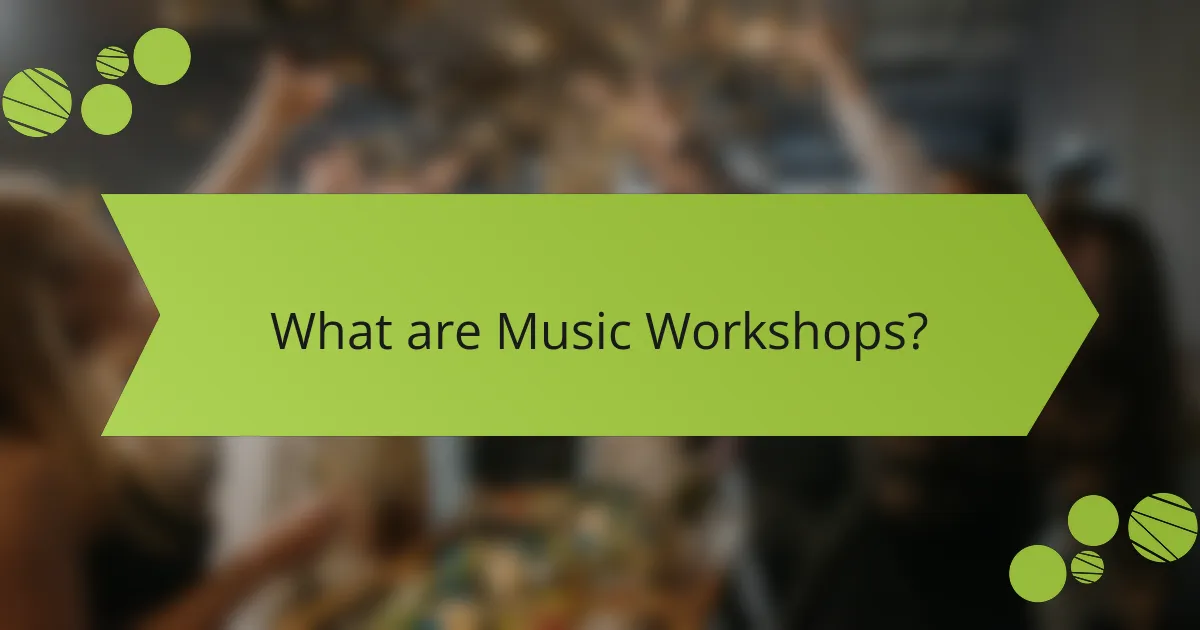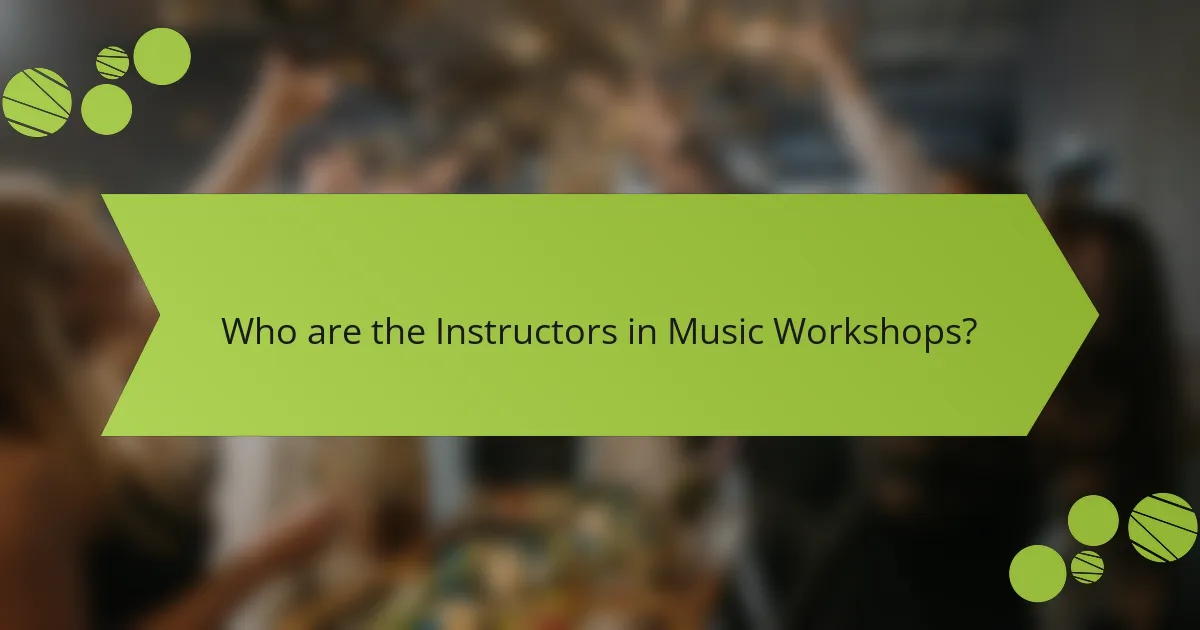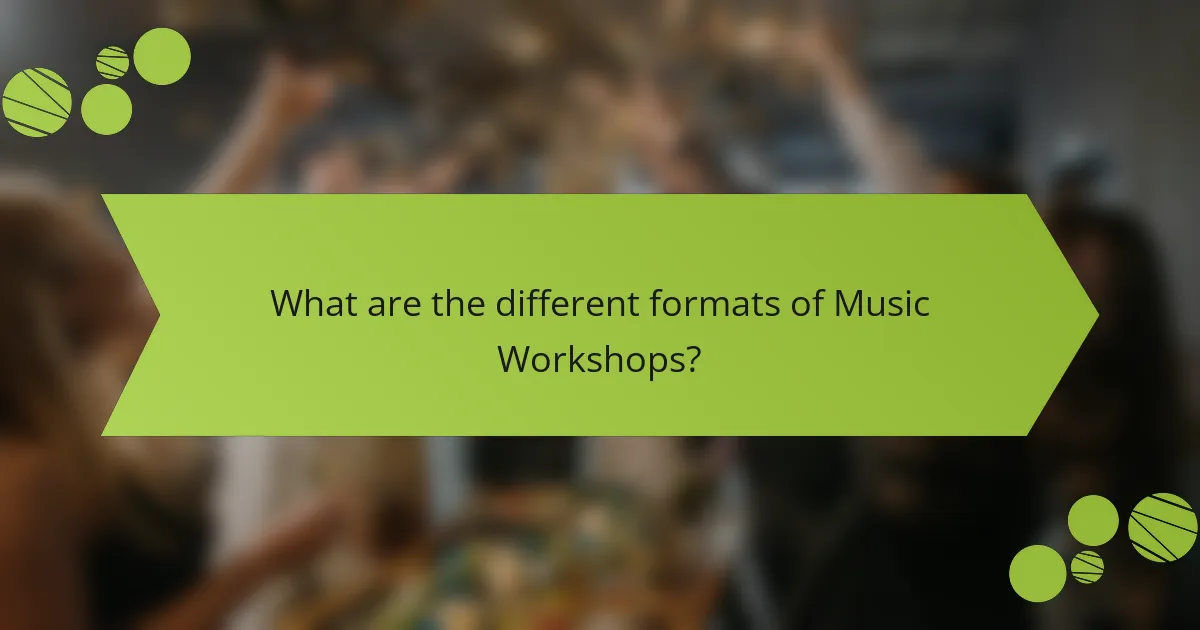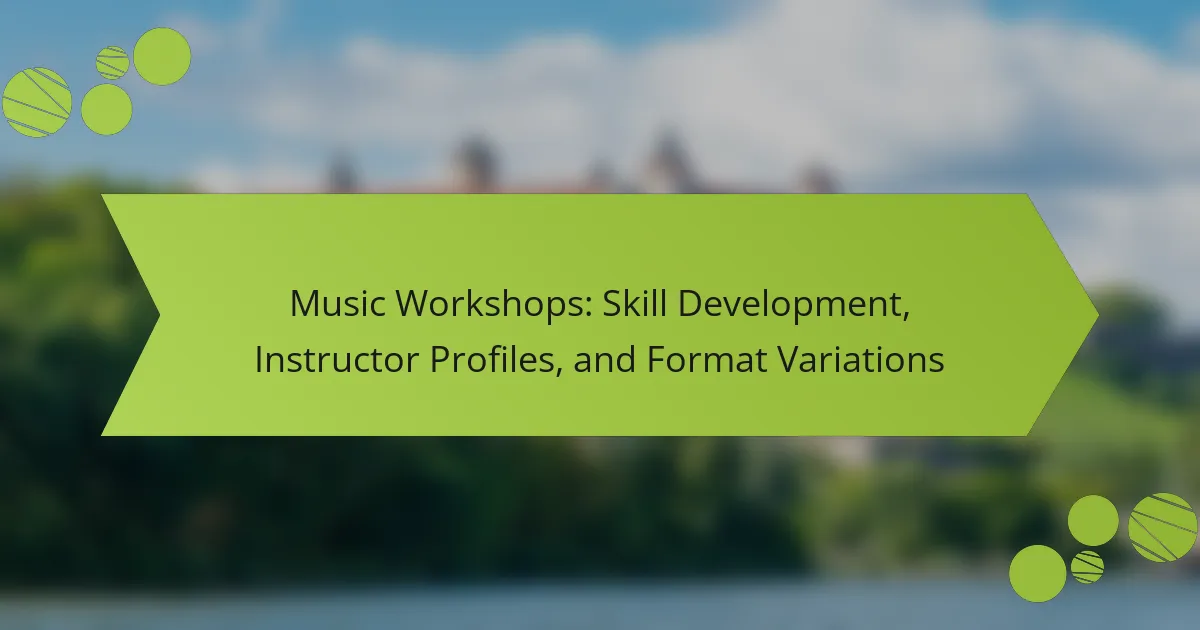Music workshops are structured educational sessions designed to teach various aspects of music, including instrument playing, songwriting, and music theory. These workshops accommodate participants of all skill levels and are typically led by experienced musicians or educators with specialized knowledge. They can be conducted in several formats, such as in-person, online, or hybrid, each catering to different learning styles. The collaborative environment of music workshops encourages creativity and networking among attendees, enhancing the overall learning experience. Instructors play a crucial role by providing tailored feedback and facilitating group activities, ensuring effective skill development for all participants.

What are Music Workshops?
Music workshops are structured educational sessions focused on teaching various aspects of music. They typically involve hands-on activities, group participation, and expert instruction. Participants can learn skills such as instrument playing, songwriting, and music theory. These workshops cater to different skill levels, from beginners to advanced musicians. Many workshops are led by experienced musicians or educators. They can take place in various formats, including in-person, online, or hybrid. Music workshops often foster collaboration and creativity among attendees. They provide a platform for networking and sharing musical ideas.
How do Music Workshops facilitate skill development?
Music workshops facilitate skill development by providing structured learning environments. Participants engage in hands-on practice with instruments or vocal techniques. Instructors offer personalized feedback, which enhances individual learning. Collaborative activities in workshops promote teamwork and communication skills. Workshops often incorporate diverse musical styles, broadening participants’ musical knowledge. Research shows that active participation in music education improves cognitive abilities. A study by Hanna-Pladdy and Mackay (2011) found that musical training enhances executive functions in adults. Overall, music workshops create opportunities for growth through practice, feedback, and collaboration.
What specific skills can participants expect to learn in Music Workshops?
Participants in music workshops can expect to learn various specific skills. These skills include instrument proficiency, music theory, and composition techniques. Participants often develop improvisation abilities and ensemble playing skills. They also gain experience in vocal techniques and ear training. Workshops may cover music production and technology use. Additionally, participants learn about performance techniques and stage presence. These skills enhance overall musicianship and can lead to greater creative expression.
How does the structure of a Music Workshop enhance learning outcomes?
The structure of a music workshop enhances learning outcomes by providing a focused and interactive environment. This format encourages active participation from attendees. Workshops often include hands-on activities, which facilitate practical application of concepts. Structured sessions promote collaboration among participants. This collaboration fosters peer learning and feedback. Clear objectives guide the workshop, ensuring that learning is targeted and effective. Research shows that interactive learning environments lead to better retention of information. According to a study by the National Endowment for the Arts, engaging in music education improves cognitive skills and creativity. Therefore, the structured approach of music workshops significantly boosts educational effectiveness.
Why are Music Workshops important for musicians?
Music workshops are important for musicians because they provide opportunities for skill development and networking. These workshops often feature experienced instructors who share valuable insights and techniques. Participants can learn new styles and improve their proficiency in various instruments. Workshops also foster collaboration among musicians, enhancing creativity and inspiration. According to a study by the National Endowment for the Arts, participation in music workshops can lead to increased confidence and performance skills. Additionally, musicians can gain exposure to different genres, expanding their artistic range. Overall, music workshops are essential for personal and professional growth in the music industry.
What role do Music Workshops play in a musician’s career development?
Music workshops play a crucial role in a musician’s career development. They provide hands-on training and skill enhancement opportunities. Participants can learn from experienced instructors and industry professionals. Workshops often focus on specific genres or techniques, allowing for targeted skill acquisition. Networking opportunities are also a significant benefit, connecting musicians with peers and industry contacts. According to a study by the National Endowment for the Arts, musicians who engage in workshops often report improved performance skills and increased confidence. This support can lead to more performance opportunities and career advancement.
How do Music Workshops contribute to community engagement in music?
Music workshops contribute to community engagement in music by providing accessible opportunities for participation. They foster collaboration among diverse groups, encouraging social interaction. Workshops often include local musicians, which strengthens community ties. Participants can learn new skills, enhancing their musical abilities. This skill development promotes a sense of achievement and belonging. Research shows that community music initiatives increase local involvement in cultural activities. According to a study by Hargreaves and North, community music engagement enhances social cohesion and individual well-being.

Who are the Instructors in Music Workshops?
Instructors in music workshops are typically experienced musicians or educators. They often possess specialized knowledge in various music genres or instruments. Many have formal training in music education or performance. Some instructors may also be industry professionals with a background in music production or composition. Their roles include teaching techniques, providing feedback, and facilitating group activities. Instructors often tailor their teaching styles to suit the needs of their students. They may also have a track record of successful performances or recordings. Their expertise enhances the learning experience for workshop participants.
What qualifications should Music Workshop instructors possess?
Music Workshop instructors should possess a degree in music or a related field. Relevant experience in teaching music is also essential. Instructors should demonstrate proficiency in at least one musical instrument or vocal performance. Familiarity with various music genres enhances their teaching capability. Additionally, effective communication skills are critical for engaging students. Certification in music education can further validate their expertise. Continuous professional development ensures instructors stay updated with teaching methods. These qualifications collectively contribute to a successful learning environment in music workshops.
How do instructors’ backgrounds influence the workshop experience?
Instructors’ backgrounds significantly influence the workshop experience by shaping their teaching styles and content delivery. Their educational qualifications determine their expertise in specific music genres or techniques. For instance, an instructor trained in classical music may emphasize theory and technique. Conversely, an instructor with a background in contemporary music might focus on improvisation and creativity.
Additionally, instructors’ personal experiences can affect their engagement with participants. Those with diverse cultural backgrounds may introduce varied musical traditions and perspectives. This can enrich the workshop environment and foster inclusivity. Research shows that instructors’ varied experiences lead to different approaches in student interaction and skill development. Ultimately, the instructor’s background is a critical factor in determining the overall quality and effectiveness of the workshop experience.
What teaching methods do effective Music Workshop instructors use?
Effective Music Workshop instructors use a variety of teaching methods to enhance learning. These methods include hands-on practice, which allows participants to engage directly with instruments. Instructors often incorporate group activities to foster collaboration among participants. Individual feedback is provided to help each learner improve their skills. Demonstrations are used to illustrate techniques clearly. Additionally, instructors may employ technology, such as audio recordings, to aid in instruction. Research shows that active participation increases retention of musical concepts. Studies indicate that collaborative learning environments improve overall student satisfaction and skill acquisition.
Why is instructor experience important in Music Workshops?
Instructor experience is crucial in music workshops because it directly impacts the quality of instruction. Experienced instructors bring a wealth of knowledge and practical skills to the learning environment. They can offer insights that enhance students’ understanding of music theory and performance techniques. Additionally, seasoned instructors are adept at identifying individual student needs and tailoring their teaching methods accordingly. Research shows that experienced educators can significantly improve student engagement and retention of information. For example, a study by the National Endowment for the Arts found that quality instruction correlates with higher student achievement in music education. Thus, instructor experience fosters a more effective and enriching learning experience in music workshops.
How does an instructor’s experience shape participant learning?
An instructor’s experience significantly influences participant learning in music workshops. Experienced instructors possess a deeper understanding of musical concepts and techniques. They can tailor their teaching methods to meet diverse learning styles. Their familiarity with common challenges allows them to provide targeted support. Research indicates that experienced educators foster a more engaging learning environment. They often use real-world examples to enhance understanding. Participants benefit from their refined communication skills and ability to inspire. Overall, an instructor’s experience directly correlates with improved learning outcomes for participants.
What unique perspectives can experienced instructors bring to workshops?
Experienced instructors bring diverse insights to workshops. They possess extensive knowledge from years of teaching and performing. This background enhances their ability to address various learning styles. They can share real-world experiences that enrich theoretical concepts. Their familiarity with common challenges allows for targeted problem-solving strategies. Experienced instructors often introduce innovative techniques based on current trends. They can also provide networking opportunities through their established industry connections. Their mentorship can inspire and motivate participants to pursue their musical goals.

What are the different formats of Music Workshops?
Music workshops can be conducted in various formats. Common formats include in-person workshops, online workshops, and hybrid workshops. In-person workshops allow direct interaction between participants and instructors. Online workshops offer flexibility and accessibility, reaching a wider audience. Hybrid workshops combine both in-person and online elements. Other formats may include masterclasses, group sessions, and one-on-one coaching. Each format caters to different learning styles and preferences.
What types of Music Workshop formats are available?
Available music workshop formats include in-person, online, and hybrid. In-person workshops occur at physical locations. These workshops often provide hands-on experience and direct interaction with instructors. Online workshops are conducted via digital platforms. They offer flexibility and accessibility for participants worldwide. Hybrid workshops combine both in-person and online elements. This format caters to diverse learning preferences and locations. Each format serves different needs and enhances the learning experience in unique ways.
How do online Music Workshops differ from in-person formats?
Online music workshops differ from in-person formats primarily in their delivery method and interaction dynamics. Online workshops utilize digital platforms for instruction, allowing participants to join from various locations. This format often includes recorded sessions, which provide flexibility in scheduling. In contrast, in-person workshops require physical attendance, fostering direct, face-to-face interaction.
Participants in online workshops may experience reduced immediate feedback due to potential delays in communication. In-person formats allow for real-time corrections and hands-on demonstrations, enhancing the learning experience. Additionally, online workshops can accommodate larger groups, while in-person sessions may have limited capacity due to space constraints.
Research indicates that online learning can be as effective as traditional methods, but it often depends on the learner’s self-discipline and engagement level. A study by the U.S. Department of Education showed that students in online learning conditions performed better, on average, than those receiving face-to-face instruction.
What are the benefits of group versus individual Music Workshops?
Group music workshops encourage collaboration and social interaction among participants. This creates a supportive environment for learning. Individual music workshops provide personalized attention and tailored instruction. Participants in group settings often benefit from diverse perspectives and ideas. They can also experience increased motivation through shared goals. Research indicates that group learning can enhance creativity and problem-solving skills. In contrast, individual workshops allow for a focused approach to mastering specific skills. Ultimately, the choice depends on personal learning preferences and goals.
How can participants choose the right format for their needs?
Participants can choose the right format for their needs by assessing their learning preferences and goals. Understanding whether they prefer hands-on practice, theoretical knowledge, or a mix of both is crucial. Participants should consider their skill level, as beginners may benefit from more structured formats. They can also evaluate the duration of the workshop, since shorter sessions may suit those with limited time. Additionally, participants should reflect on the type of interaction they desire, such as one-on-one feedback or group collaboration. Research indicates that personalized learning formats increase engagement and retention (Hattie, J., & Donoghue, G., 2016). By aligning these factors with available workshop options, participants can make informed decisions.
What factors should participants consider when selecting a Music Workshop format?
Participants should consider the workshop’s objectives when selecting a Music Workshop format. Different formats cater to various skill levels and learning goals. The duration of the workshop is another crucial factor. Short workshops may focus on specific skills, while longer formats can provide in-depth learning. Participants should also evaluate the instructor’s qualifications and teaching style. Experienced instructors may offer more valuable insights. The format’s interactivity is important as well. Hands-on experiences can enhance learning outcomes. Additionally, group size can influence the level of individual attention received. Smaller groups often allow for more personalized instruction. Lastly, participants should consider the availability of resources and materials provided in the workshop. Access to quality instruments and learning materials can significantly impact the learning experience.
How does the choice of format impact the overall learning experience?
The choice of format significantly impacts the overall learning experience in music workshops. Different formats, such as in-person, online, or hybrid, influence engagement levels. In-person workshops often foster direct interaction and collaboration among participants. Online formats can provide flexibility and accessibility for a wider audience. Hybrid formats combine the benefits of both, allowing for varied learning styles. Research indicates that active participation enhances retention of skills and knowledge. A study by the National Endowment for the Arts found that hands-on experiences in workshops lead to greater skill acquisition. Thus, the format chosen directly affects participant outcomes and satisfaction.
What are some best practices for maximizing the Music Workshop experience?
Engaging actively in the Music Workshop maximizes the experience. Participants should arrive prepared with instruments and materials. Setting specific personal goals enhances focus during sessions. Collaborating with peers fosters creativity and skill-sharing. Seeking feedback from instructors allows for targeted improvement. Regular practice outside of workshops solidifies learning. Staying open to new ideas enriches the overall experience. Research indicates that active participation increases retention and skill development in music education.
Music workshops are structured educational sessions designed to teach various aspects of music, including instrument proficiency, songwriting, and music theory. The article explores how these workshops facilitate skill development through hands-on activities, personalized feedback, and collaboration among participants. It also highlights the importance of experienced instructors, their qualifications, and how their backgrounds influence the workshop experience. Additionally, the article discusses different workshop formats, including in-person, online, and hybrid options, and provides guidance on selecting the right format based on individual learning preferences and goals. Overall, music workshops play a crucial role in the personal and professional growth of musicians while fostering community engagement in music.
